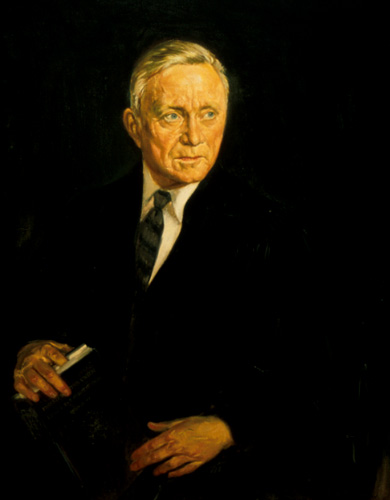Dissenting, Kingsley Books, Inc. v. Brown, 354 U.S. 436, 447 (1957)
Judicial opinions
William O. Douglas: Frases em inglês
Dissenting, Paris Adult Theatre I v. Slaton, 413 U.S. 49 (1972)
Judicial opinions
Letter to Young Lawyers Section of the Washington State Bar Association (10 September 1976), The Douglas Letters : Selections from the Private Papers of Justice William O. Douglas (1987), edited by Melvin I. Urofsky and Philip E. Urofsky, p. 162
Other speeches and writings
“The liberties of none are safe unless the liberties of all are protected.”
A Living Bill of Rights (1961), p. 64
Other speeches and writings
Dissenting, Poulos v. New Hampshire, 345 U.S. 395 (1953)
Judicial opinions
An Almanac of Liberty (1954), p. 238
Other speeches and writings
Statement to Justice Potter Stewart on the arrest of peacefully protesting Vietnam War veterans on steps of the Supreme Court, in The Court Years, 1939-1975: The Autobiography of William O. Douglas (1981), p. 234
Other speeches and writings
“The right to revolt has sources deep in our history.”
An Almanac of Liberty (1954), p. 107
Other speeches and writings
“Religious experiences which are as real as life to some may be incomprehensible to others.”
United States v. Ballard, 322 U.S. 78 (1944)
Judicial opinions
"The One Un-American Act," Speech to the Author's Guild Council in New York, on receiving the 1951 Lauterbach Award (December 3, 1952) http://ala.org/ala/aboutala/offices/oif/foryoungpeople/theoneunamerican/oneunamerican.cfm
Other speeches and writings
Dissenting, Osborn v. United States, 385 U.S. 323, 343 (1966)
Judicial opinions
Dissenting, Poulos v. New Hampshire, 345 U.S. 395 (1953)
Judicial opinions
“Literature should not be suppressed merely because it offends the moral code of the censor.”
Dissenting, Roth v. United States, 354 U.S. 476 (1957)
Judicial opinions
Dissenting, Ullmann v. United States, 350 U.S. 422 (1956)
Judicial opinions
Concurring, Youngstown Sheet & Tube Co. v. Sawyer, 343 U.S. 579 (1952)
Judicial opinions
“The Constitution favors no racial group, no political or social group.”
Dissenting, Uphaus v. Wyman, 364 U.S. 388, 406 (1960)
Judicial opinions
“The Court's great power is its ability to educate, to provide moral leadership.”
Interview with Time magazine (12 November 1973)
Other speeches and writings
“We are a religious people whose institutions presuppose a Supreme Being.”
Writing for the court, Zorach v. Clauson, 343 U.S. 306 (1952)
Judicial opinions
Dissenting, United States v. Wunderlich, 342 U.S. 98, 101 (1951)
Judicial opinions
“Tell the FBI that the kidnappers should pick out a judge that Nixon wants back.”
The Court Years, 1939-1975: The Autobiography of William O. Douglas (1980), p. 232
Other speeches and writings
“The right to be let alone is indeed the beginning of all freedom.”
Dissenting, Public utilities Commission v. Pollak, 343 U.S. 451, 467 (1952)
Judicial opinions
“The rules when the giants play are the same as when the pygmies enter the market.”
Dissenting, Scherk v. Alberto-Culver Co., 417 U.S. 506, 526 (1974)
Judicial opinions
Remarks at conference sponsored by the American Histadrut Cultural Exchange Institute, Harriman, New York (February 17–19, 1967); reported in Judd L. Teller, ed., Government and the Democratic Process; A Symposium by American and Israeli Experts (1969), p. 16
Other speeches and writings
Dissenting, Osborn v. United States, 385 U.S. 341 (1966)
Judicial opinions
Writing for the court, Gray v. Sanders, 372 U.S. 368, 381 (1963)
Judicial opinions
“That seems to us to be the common sense of the matter; and common sense often makes good law.”
Writing for the court, Peak v. United States, 353 U.S. 43 (1957)
Judicial opinions
“It seemed to me that I had barely reached the Court when people were trying to get me off.”
The Court years, 1939-1975: The Autobiography of William O. Douglas (1980), p. 3
Other speeches and writings
“The way to combat noxious ideas is with other ideas. The way to combat falsehoods is with truth.”
Mike Wallace interview (4 November 1958), quoted in The Great Quotations (1966) by George Seldes
Other speeches and writings
Dissenting, DeFunis v. Odegaard, 416 U.S. 342 (1974)
Judicial opinions
